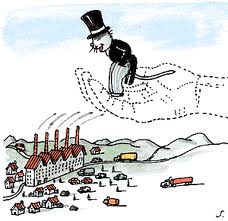Invisible Hand
Oct 29, 2022. Sync, How Order Emerges from Chaos in the Universe, Nature, and Daily Life, by Strogatz, Steven H., Hachette Books, 2003, develops many examples of self-organizing systems in the physical and biological worlds.
Dictionary.com describes the pure free market mechanism. The Invisible Hand in the economics of Adam Smith,
an unseen force or mechanism that guides individuals to unwittingly benefit society through the pursuit of their private interests.
Investopedia is more precise and careful when they define the Invisible Hand.
a metaphor for the unseen forces that move the free market economy. Through individual self-interest and freedom of production as well as consumption, the best interest of society, as a whole, are fulfilled. The constant interplay of individual pressures on market supply and demand causes the natural movement of prices and the flow of trade.
The Invisible Hand is the action of the free market economy which sums individual self-interested activities to the benefit of all society. The “as a whole” recognizes that all results are not perfect.
Consequence
Because it claims the best interest of society is served, supporters of free markets argue strenuously against any interference by government with market activities.
As noted economist Paul Samuelson put it, “pursuing his own selfish good was led, as if by an invisible hand, to achieve the best good of all, so that any interference with free competition by government was almost certain to be injurious.”
Conditions and Scope
Because a good can be bought and sold at a market is not sufficient to label it a free market. Also, there must be multiple vendors supplying the good as well as consumers with access to relevant facts to make an informed selection. There must be a competitive marketplace, not oligarchies controlling the goods or services.
Certain goods and services do not have competitive markets. These public goods—national defense and infrastructure—are vastly expensive. No one company can afford to provide the service on their own without public (government) help. The cost of furnishing of the army, navy, and air force is not the result of supply-demand equilibrium, neither is the costs of roads, bridges, water supply, and so on.
Their costs are beyond the marketplace. Once the societal value is determined by politicians and government experts, contract bidding introduces an element of price competition. But it follows the societal value, it does not determine it.
All federal expenses are rooted in legislation and not in the free market. The United States federal budget in 2018 was 35% of the national GDP.
Ideal Law
The goals of society should precede the goals of economics. Freedom of opportunity, equal pay for equal work, and livable wages for full-time workers should not be sacrificed because the Invisible Hand of market forces might operate better if those societal goals were ignored.
With more than a third of the US economy arising from valuations outside the free market, the reliance of the Invisible Hand to guide allocation of resources is not unlimited. Also observing economic boom and busts, bankruptcies, shortages of desired goals, and extreme income inequality, it’s better to consider the Invisible Hand as an ideal law, often controverted by reality.
Economic Analysis
Despite the general success of the pricing mechanism in aligning economic activities, when media analysts claim that the free market and the Invisible Hand always arrives at the best answer, try to recall the need for competitive markets and their constrained scope.
Image of the Invisible Hand, from jeff-for-progress.blogspot.com
Invisible Hand, sums up individual actions to best pricing and allocation
Design without Designer
Fallacy of Composition, individual actions can lose their advantage
Good for One
Invisible Hand’s Scar



I think you do not completely buy the theory.
I think too much is claimed for the Invisible Hand, esp. when recast in business circles as “the market knows best”.
That error is similar to that of social darwinism, applying a sensible principle to a different condition. In Social Darwinism, from evolution of the species to worth of an individual. In the Invisible Hand, from resource allocation to social conditions.